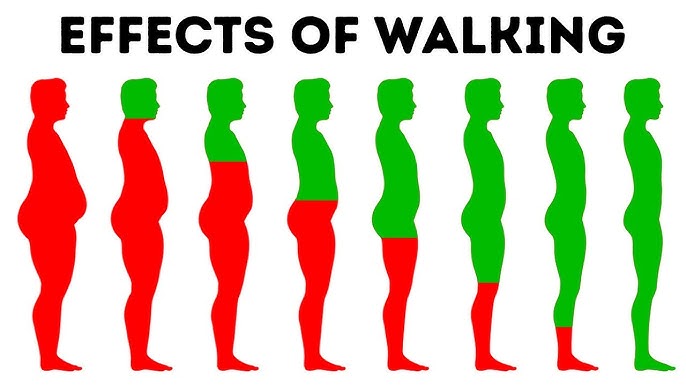You might not think of walking as a form of exercise, but it actually offers significant health benefits. Many people don’t prioritize walking because they prefer to go to the gym or use high-tech fitness equipment. But even something as simple as a 30-minute walk daily can have a huge impact on your physical and mental health. It costs nothing, requires no equipment, and can be done almost anywhere. Walking can help people of all ages and fitness levels live healthier lives in a way they enjoy.
Heart Health
Walking is good for heart health because it strengthens the heart, which in turn improves blood circulation. A brisk 30-minute walk daily can help lower blood pressure, reduce the risk of heart disease, and keep cholesterol levels stable. Improved circulation, less pressure on the blood vessels, and a healthy heart rate are all benefits of exercise. Compared to intense exercise, walking is less stressful on the body but still offers significant benefits for the heart. Therefore, walking is an excellent choice for people who want a healthy heart in the long run.
Weight Management
Those who want to manage their weight can find daily walking very beneficial. A 30-minute walk burns calories, boosts your metabolism, and encourages the body to use fat for energy. A daily walk, combined with a healthy diet, can help you lose weight steadily or maintain your weight. Walking is a sustainable exercise, unlike extreme diets or intense workout programs. This makes it easier to achieve lasting results.
Strengthens Bones and Muscles
Besides its benefits for the heart, walking is also good for bones and joints. Daily walking can make your legs, hips, and core stronger and more flexible. It maintains bone mass, which reduces the risk of osteoporosis as you age. Walking helps keep bones strong because it allows you to bear weight. In the long run, this means better posture, improved balance, and a lower risk of falls, especially for older adults.
Good for Mental Health
Walking is good for both your mental and physical health. Endorphins are natural substances produced in the body that make you feel good. Walking releases endorphins, which can reduce stress and anxiety and improve overall well-being. People who walk daily often report feeling better, more focused, and less stressed by everyday problems. Walking in nature can energize you because you have access to fresh air, sunlight, and nature, all of which can improve mental health.
Sleep Aid
Walking makes it easier to fall asleep and sleep through the night. A 30-minute walk daily can rebalance your body clock, making you less restless and helping you sleep better. People who have trouble sleeping or have irregular sleep patterns often find that regular walking helps them sleep better and longer. A healthy lifestyle and more energy during the day are both closely linked to better sleep.
Increase Your Energy Level
People often think that exercise makes them tired, but a 30-minute walk can actually make you more energetic. It helps your body use food as energy, improves blood circulation, and delivers more oxygen to your cells. This can help you feel more alert and active during the day. A daily walk can replace sugar or coffee and provides a long-lasting, natural energy boost that’s good for your health.
Live Longer
One of the benefits of daily walking is that it can help you live longer. Studies have shown that people who walk regularly generally live longer and have a better quality of life. Walking reduces the risk of chronic diseases such as diabetes, cardiovascular disease, and certain types of cancer. Walking can help us age better by reducing inflammation, strengthening the immune system, and maintaining a healthy weight. A daily walk is a simple exercise that can extend your lifespan.
Improves Brain Function
Walking increases blood flow to the brain, which helps with memory, concentration, and overall brain function. Many people who walk daily experience improved concentration, faster problem-solving, and mental acuity. Walking has been linked to a lower risk of Alzheimer’s disease and cognitive decline. Walking can also make you more creative, which is why many professionals and thinkers use it to clear their minds and generate new ideas.
Easy to integrate
Question: Is walking daily enough exercise?
Yes, a 30-minute walk a day is enough to meet the World Health Organization’s guidelines for light exercise and is very beneficial for your health.
Walking: Can it help you lose weight?
When combined with a healthy diet, walking can help you lose weight. Walking burns calories, boosts your metabolism, and helps you manage body fat.
Question 3: When is the best time to walk?
There is no optimal time to walk. A morning walk can give you energy for the whole day, while an evening walk can help you rest and relax. Regularity is essential.
Question 4: Do I need to walk briskly to see results?
Brisk walking is better for your heart, but walking at a reasonable pace is still beneficial. It’s important to walk regularly and keep your back straight.
Can walking replace a visit to the gym? Walking is very beneficial for your health, but it probably can’t replace all other forms of exercise. For best results, combine walking with muscle training and stretching whenever possible.
Summary
This simple yet effective habit can improve your health: walking 30 minutes a day. The benefits are numerous and long-lasting. For example, walking can improve heart function, promote weight loss, enhance your mental well-being, and improve sleep quality. Unlike some other difficult exercise habits, walking is easy, enjoyable, and sustainable. A daily walk will help you live a better, more active, and longer life. All you need is the first step, a 30-minute walk, and a pair of comfortable shoes.




